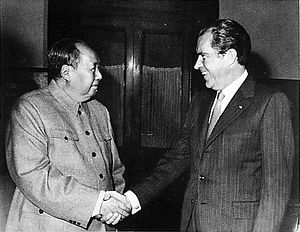On February 28, we celebrate the 45th anniversary of the Shanghai Communique. The 1972 agreement, brokered by Secretary of State Henry Kissinger and Chinese Premier Zhou Enlai, ended 23 years of diplomatic estrangement between the United States and China, and laid the foundation for a peaceful and prosperous Asia. The Vietnam War was still raging when the Communique was signed but there has been no major war in the Asia-Pacific since that time. The Communique was based on America’s acknowledgement that Chinese on both sides of the Taiwan Strait agree there is one China, that Taiwan is a part of China, and that the United States does not challenge that position.
This diplomatic triumph was one of the great American successes of the past century. It has fostered peace in the Taiwan Strait and enabled Taiwan to evolve from an authoritarian state to a vibrant democracy. It has allowed cross-Strait social, economic, and cultural relations to flourish and bring real benefits to people in China and Taiwan, at no cost to the United States.
I moved to Taiwan four months after the Communique was issued, and studied Chinese at Taiwan Normal University. Taiwan was then an authoritarian state under Chiang Kai-shek, where talk of democracy and participation in independent political parties could get you thrown in jail. I later returned to Taiwan and worked for a Taiwan trading company. I saw that the stability provided by the framework was allowing Taiwan companies to expand internationally. When I returned to Taiwan 25 years later as an investor, the democratically elected government welcomed our investment in the island’s nascent cable television and high-speed internet business. The stability in cross-Strait relations created by the Communique’s framework gave us the confidence to make a $200 million infrastructure investment, even knowing that our returns would be years away. An unraveling of this framework would shake the confidence of the thousands of investors that walk the path that I did, deeply injure the people of Taiwan, and jeopardize more than $17 billion of U.S. investments there.
After living in Taiwan, earning my law degree and serving in the U.S. State Department, I moved to Beijing in 1979. I saw first-hand the abject poverty in China that the country’s closure had brought. I met Chinese who were afraid to speak with me because I was a foreigner. Chinese friends needed to get approval for me to go to their house for dinner; in fact my first meal at a friend’s house was approved by the vice mayor of Beijing.
Today, however, because the Shanghai Communique structure has worked, Chinese can associate with whomever they choose without asking, hundreds of millions of people have been lifted out of poverty, and I have been succeeded by tens of thousands of American investors and businesspeople who have helped build the largest bilateral trading relationship in world history. Around $160 billion of U.S. goods and services are sold in China annually, representing nearly one million U.S. jobs, with another 100,000 American jobs supported by Chinese direct investment in the United States. Apple makes the bestselling phones in China and General Motors is the bestselling car brand. The work of Premier Zhou and Secretary Kissinger succeeded beyond their wildest imaginings.
By contrast, U.S. policies in South Asia, the Middle East, Africa, South America, and Europe have often not succeeded. Just think of the wars that have been fought, the poverty that has not been alleviated, and the historical enmities that remain in those places, and you understand the success of the Shanghai Communique. The peace, prosperity, and productivity it has fostered stands as a shining example of successful American diplomacy. While there is legitimate debate about numerous issues in the U.S.-China relationship, including trade, human rights, maritime issues, the South and East China Seas, and North Korea, the United States gains nothing from challenging a policy that has served Americans well for 45 years. Let us celebrate the Communique’s 45th anniversary; let us praise Secretary Kissinger and Premier Zhou Enlai for their wisdom and trust that it will bring us another 45 years of peace in the Asia Pacific.
Stephen Orlins has been President of the National Committee on U.S.-China Relations since 2005. Previously, he was President of Lehman Brothers Asia, Managing Director of Carlyle Asia and a member of the US State Department’s legal team that helped establish diplomatic relations with China.

































